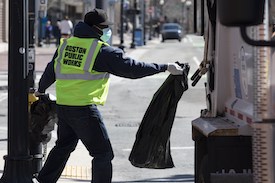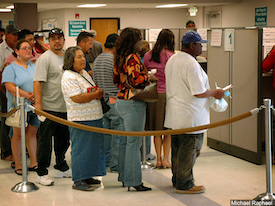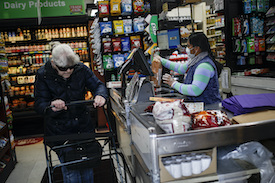Suffering workers forgotten as Covid-19 shuts down America?
By Barrington M. Salmon Contributing Writer @bsalmondc | Last updated: Mar 24, 2020 - 2:01:11 AMWhat's your opinion on this article?
WASHINGTON—The presence of the coronavirus in all 50 American states and the District of Columbia has had government officials at all levels scrambling to test, treat, and monitor confirmed cases and prepare for what many medical experts, epidemiologists and others say is a gathering storm.
Official guesstimates are that it will take weeks for the U.S. to see the peak of the global pandemic and months after that for the disease to run its course. Already though, low-wage and middle-income workers are bearing the brunt of the economic disarray coronavirus has brought with it.

All over the country as state governors impose partial or near-total shutdowns and restrict the movement of their respective populations, those in the hospitality and service industries—owners or operators of bars, restaurants, gyms, daycare centers, hair and nail salons, barbershops and other establishments—are watching revenue dry up.
Pittsburgh resident James Conway, 63, is one restaurant worker who faces an uncertain future.
“I have been a server at Olive Garden in Pittsburgh for the last 16 years. My wife is retired, and I am the breadwinner of the family,” he said. “On March 15, without any prior notice, my coworkers and I were told that Olive Garden dine-in operations will be closed, as part of mandatory efforts to prevent the spread of the coronavirus. The management did not tell me when I may have a job again.”
“Since I started working for Olive Garden, Darden Restaurants—our parent company—has never provided me paid sick days, and paid family and medical leave. I also never had health insurance from the company. For four days a week, I work about six hours per day. My pay rate started at $2.83 per hour plus tips—and now, after 16 years, I get $2.83 per hour, plus tips!”
Mr. Conway shared his story during a March 20 conference call sponsored by Restaurant Opportunities Centers United to show the coronavirus impact on restaurants. In early March, as the coronavirus began to unfold, officials at Darden announced full-time workers will get up to five paid sick days.

“These are accrued paid sick days, depending on the worker’s length of service. But since I am a part-time worker, I would only be eligible for 15 hours—or about two days,” Mr. Conway said. Yesterday Darden announced two-week emergency pay for those affected by the closure. While I applaud both these gestures, they’ve both come in the last week in response to the pandemic, and I think we all know this crisis will extend beyond two weeks. I call on restaurants everywhere to invest more in their employees by giving paid sick days to all workers and paying tipped employees one fair wage!”
Mr. Conway said with the restaurant closed, he is worried about his next paycheck.
“I have already applied for unemployment benefits, but I was told that it may also take a few more days or even weeks to process,” he said. “I am glad that ROC United has set up an emergency fund which has already come through with food and essential products for my co-worker who is a single mother struggling to make ends meet. ROC [has] been a tireless advocate for restaurant workers getting better pay and benefits.”
Portia Green, a single mother of a 13-year-old daughter, who lives with her fiancsé in Harlem, New York, hit a wall when the effects of coronavirus took hold.
“I have been in the restaurant industry for more than 10 years now, so I have practically raised my daughter with my income from independently serving and bartending in various conventions and large office meetings,” she said. “When state officials enforced cancellations of gatherings for a large number of people, my livelihood has also been cancelled. Since March 12, when closures around the city started to happen, I have not received a paycheck. I have been spending time with my daughter at home, but I am also worried what will happen to us in the coming days, weeks or months.”
Like the majority of restaurant workers, Ms. Green said, she doesn’t have paid sick days and paid leave benefits.

“In order to survive during this coronavirus crisis, I have no choice but to apply for public assistance such as food stamps and unemployment benefits,” she said. “We don’t know when the restaurants and catering businesses will reopen again. As of now, more than 300,000 restaurant workers are already out of a job. I hope that the government assistance will be expanded until the economy picks up again.”
Restaurant Opportunities Centers United is a nonprofit organization fighting to improve wages and working conditions for the nation’s restaurant workforce. Founded after Sept. 11, 2001, as a worker relief center for affected restaurant workers and their families, ROC United has grown into a national organization, activating thousands of restaurant workers, employers, allies, and consumers.
Teófilo Reyes said his organization has been busy talking to, and trying to negotiate with restaurant owners, association leadership and anyone in the position to agree to provisions that would provide much-needed protections for restaurant employees.
“We are facing an unprecedented crisis due to the spread of the novel coronavirus. To date, 36 states and the District of Columbia have shut down their restaurants and other public-facing businesses,” said Mr. Reyes, deputy director of programs and research at ROC United. “An additional three have restricted access to customers. Millions of restaurant workers have had their hours drastically cut, and millions more have been thrown out of work entirely. For now, many restaurants continue to operate with a skeleton staff providing essential services of food delivery and takeout without access to personal protective equipment.”
Mr. Reyes said employees are in this situation because of the lack of leadership shown by our government and corporate leaders.

“They have not had a timely, comprehensive, or effective preparedness and response plan. President Trump and the National Restaurant Association are meeting as we speak to discuss a bail out for restaurants,” he said. “Today we learned that McDonald’s and the National Restaurant Association are leading the lobbying charge to prevent emergency paid sick leave for America’s workers.”
Elsewhere, mass layoffs have begun. Jaime Contreras, vice president of 32BJ SEIU, said thousands of airport workers are being laid off, adding that it could be the tip of the iceberg. Even though a reduction in hours and layoffs are rapidly increasing, he said, thus far, more than 500 contracted cabin cleaners, skycaps, baggage handlers, lobby and ramp workers are going to be laid off, including about 438 at Washington Dulles International Airport, around 50 at Washington Reagan National Airport and more than 78 at Baltimore Washington Thurgood Marshall Airport.
Mr. Contreras explained that the $60 billion airline industry bailout proposal contains no provisions to protect the most vulnerable contracted workers who have been on the frontlines of the coronavirus crisis for weeks.
“As the airlines continue to lobby Congress to secure their bailout, thousands of low-wage workers, mostly men and women of color, are being thrown out on the street. It’s not just corporations that need support, it’s contracted workers who are actually the ones on the front lines and lack both health and financial protections. There’s no reason basic protections for contracted airport workers shouldn’t be included and we are going to keep pushing for that,” said Mr. Contreras.
“These contracted employees are on the frontlines of the day-to-day airport operations at Dulles Airport,” he added. “They care for our elderly and disabled loved ones, they move our baggage, they clean planes from national and international destinations, and they interact with hundreds of thousands of passengers from around the world. They are the most at risk in the face of this global pandemic, and they are the least who can afford to lose wages and benefits during this time of crisis.”
Most Americans have never dealt with a public health crisis that threatens to completely and unalterable change the way people live in addition to the reality of the millions of people who are losing their jobs, tens of thousands of businesses being forced to close, most forms of travel deeply crippled amid fear and uncertainty.

New York Mayor Bill de Blasio echoed the fears of most Americans while discussing the prospect of hospitals in the city facing severe shortages of supplies and protective equipment.
“The worst is yet to come. We expect April will be a lot worse than March and I fear May could be worse than April,” he said during a CNN interview.
According to the New York Times, a 100-page federal government plan to combat the coronavirus warned policymakers that a pandemic “will last 18 months or longer” and could include “multiple waves,” resulting in widespread shortages that would strain consumers and the nation’s health care system.
The 100-page plan, which was shared with what reporters called “a grim prognosis for the spread of the virus,” also “outlined a response that would activate agencies across the government and potentially employ special presidential powers to mobilize the private sector.”
“The spread and severity of COVID-19 will be difficult to forecast and characterize,” the government plan said. The plan which was shared with the New York Times, warned of “significant shortages for government, private sector, and individual U.S. consumers.”
Dr. Anthony Fauci, director of the National Institute of Allergy and Infectious Diseases, said Americans will most likely have to continue staying at home and practicing social distancing for “at least several weeks” as the coronavirus spreads.
“If you look at the trajectory of the curves of outbreaks and other areas, it’s at least going to be several weeks. It probably would be several weeks and maybe longer before we know whether we’re having an effect,” Dr. Fauci said during a recent Today show interview.
The U.S. is now ranked third highest globally in total COVID-19 cases. According to stats compiled by the Center for Systems Science and Engineering at Johns Hopkins University, globally more than 316,000 people have contracted the novel coronavirus and at least 13,500 have died. A CNN health tally logged more than 32,000 cases of the novel coronavirus in the United States as of March 23. At least 400 people had died from the virus in the U.S., said CNN. More than 91,000 people have recovered worldwide.
Because of wage and salary disparities and health indicators that rank low overall, Black Americans are seen as being at greater risk than the larger population. Others who are most vulnerable as the virus spreads are those incarcerated in jails and prisons, the Black elderly and seniors in general.
New York City has recorded the nation’s largest coronavirus jail outbreak to date. At least 38 people have tested positive at the Rikers Island prison complex. Other locales have released low level and non-violent offenders in hopes of curbing the spread of the virus.
In the absence of clear direction from the federal government, governors from New York, Illinois, New Jersey and Connecticut signed executive orders mandating all nonessential workers to stay home as much as possible. California Governor Gavin Newsom essentially shutdown activities in the state. In all, close to 75 million people will be affected.
The orders encourage people to stay home, but they can still get things like medicine, exercise and groceries, if they adhere to the injunction of staying at least six feet away from each other. Essential businesses such as health care providers, convenience stores, gas stations and restaurants with take-out or delivery service only are allowed to remain open. Public transportation and roadways also remained open.
Economists and other financial experts warn of a global recession that will be deepened as businesses close and workers lose hours or their jobs as officials attempt to stop the spread of the virus. If businesses close permanently or there are waves of layoffs over time, it is feared these changes will have an enduring impact on local economies if companies are shuttered for good.
Chris Wheat, the director of business research at JPMorgan Chase Institute, told NBC News, the fate of a number of small businesses hangs in the balance: “These businesses don’t have much cash to begin with,” he said. “The institute published a study of 1.4 million small urban businesses in September showing that 29 percent of the businesses were not profitable. Nearly half of those surveyed had two weeks or less of cash liquidity.”
Generally financial experts say, most small businesses, particularly Black-owned businesses, lack the financial cushion needed to last more than a few days, weeks or months in individual cases.
Hopes for an injection of certainty with passage of a $2 trillion Republican proposal to provide loans for small businesses, direct funds to ill-equipped hospitals, bolster families, support closed, struggling and failing businesses crashed March 22. Senate Democrats refused to support the proposal, saying it failed to satisfactorily protect millions of workers, those most in need of protection, during the crisis.
So the turmoil in the markets and unrest among Americans will likely continue, as the country hurdles towards a near-future dominated by the coronavirus, inevitable “community spread,” and rising instances of death.
INSIDE STORIES AND REVIEWS
-
-
About Harriett ... and the Negro Hollywood Road Show
By Rabiah Muhammad, Guest Columnist » Full Story -
Skepticism greets Jay-Z, NFL talk of inspiring change
By Bryan 18X Crawford and Richard B. Muhammad The Final Call Newspaper @TheFinalCall » Full Story -
The painful problem of Black girls and suicide
By Charlene Muhammad -National Correspondent- » Full Story -
Exploitation of Innocence - Report: Perceptions, policies hurting Black girls
By Charlene Muhammad -National Correspondent- » Full Story -
Big Ballin: Big ideas fuel a father’s Big Baller Brand and brash business sense
By Bryan Crawford -Contributing Writer- » Full Story






 Click Here Stay Connected!
Click Here Stay Connected!








